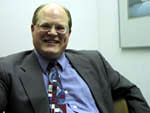By Elizabeth Stawicki
Minnesota Public Radio
March 25, 2002
|
| RealAudio |
Golden Valley lawyer Greg Wersal gets his day before the highest court in the land March 26. The United States Supreme Court will take up Wersal's challenge to a Minnesota ethics rule that bars judicial candidates from announcing their views on political and legal issues likely to come before the court. The case has drawn widespread attention since at least 39 states restrict judicial speech to some degree.
| |
|
|
|
||
Two-time Minnesota Supreme Court candidate Greg Wersal has spent the past five years speaking loudly about having to keep silent on his legal and political views.
"When I first brought up this idea back in 1996, I was told by a lot of people you're beating your head against the wall; you're never going to get anywhere," he said.
Back then, Wersal held news conferences standing next to plywood cow props to attract attention because he said Minnesota's ethics rule banned him from talking about the controversial issues of the day. Wersal says he's never advocated that judicial candidates be allowed to promise how they'd rule. But he says voters should have more information than they do now about the views of candidates for the bench:
"Understand we have many fine judges in Minnesota. We also have some who aren't so fine," Wersal said. "Voters have no information on who these people are and why they should vote for them."
But Wersal's opponent in 2000, Justice James Gilbert, disagrees.
"That is a total falsehood because he could talk about things. He chose not to talk about the budget, the administration of justice, or all these legitimate issues. And just to make a basic fool out of himself, frankly, standing out there with cows and balls and chains. It's incredible and I think the people spoke in the last election when he ran against me," Gilbert says.
Gilbert defeated Wersal by a 2-1 margin.
The American Judicature Society, a nonpartisan organization that promotes judicial independence supports Minnesota's ethics rule and has filed a friend of the court brief in the U.S. Supreme Court case.
| |
|
|
|
||
The group argued allowing judicial candidates to take positions on issues would undermine the impartiality of the courts. The society's Cynthia Gray says 39 states restrict judicial speech to some degree. She says judicial candidates can talk about important issues that concern the courts such as how they would eliminate case backlogs or improve racial disparities.
"So there are ways of running these campaigns. It takes a different tact then politicians are sometimes used to, but that's because the judicial office is different. But that's the tension between voter education and maintaining the independence and impartiality of the judiciary," Gray says.
The governor appoints most judges in Minnesota. He bases appointments for district judges on the suggestions of 49 citizens. He bases appointments for members of the Court of Appeals and state Supreme Court on the recommendations of a separate ad hoc committee. After an appointment, judges must run for election to retain their seats. Gov. Jesse Ventura supports the rule that restricts judicial speech.
"You want your judicial people to be a little bit aloof from the typical political bickering that goes on on regular candidates," Ventura says. "I think they should be a judge and judge to the best of their ability and rule on the rule of law and not start being opinionated on how they're going to rule on laws that are made."
Some Minnesota judges, who asked not to be named, say Wersal's challenge to the ethics rule on campaign speech is an attempt to inject highly controversial issues, like abortion, into judicial campaigns.
The Republican Party has joined Wersal in the U.S. Supreme Court case. Its representative, James Bopp, Jr., has been general counsel for the James Madison Center on Free Speech for the past five years. He's been general counsel for the National Right to Life Committee for the past 24.
When asked whether the party's interest in the case was solely based on free speech or had a more specific issue at stake, Bopp replied, "I've been involved in a wide variety of issues. I've been involved in the hospice. And regardless of my views on hospice, I'm still in favor of free speech. I was a Boy Scout and I'm still in favor of free speech regardless of my views on the Boy Scouts."
The American Judicature Society's Cynthia Gray says in the past, special interest groups have focused on gubernatorial and legislative races. She says that's now changing to increasingly include state Supreme Court races.
"They've been focused on the elections, particularly the Supreme Court races because the judiciary does have a lot of power in the country they are a check on the other two branches. There's been an increased interest in supreme court races, that has increased the attention being made which increases the pressure for more speech and more promises and more commitments," she says.
Even though Greg Wersal is no longer a judicial candidate and is free to talk about legal and political issues, he chooses not to. He says he still has an ethical complaint pending against him from the board of judicial standards. Wersal says he's considering running for the state Legislature where he says he can speak his mind.
"If we win in front of the U.S. Supreme Court, we will have basically taken the judicial system and made a major fix to it, I think. And there's only two more branches of government left, so it's time to move on, maybe to the next branch," Wersal says.
It's expected the high court will decide the case this term.
More from MPR

